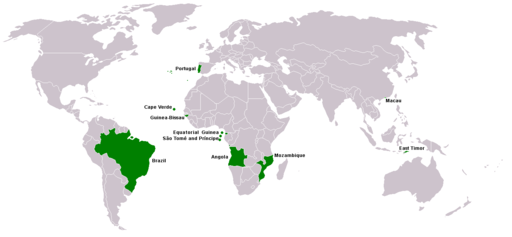5 Reasons Why You Should be Learning Portuguese
Whenever people decide to embark on a language learning journey, they tend to choose languages like Spanish or French. It’s not all that surprising considering these two languages are common staples in most learning institutions. Portuguese seems to be a much less popular choice, which is mind-boggling considering all the benefits there are to learning this fascinating tongue. Need some convincing? Read on for 5 great reasons why you should be learning Portuguese!
1. It’s one of the most spoken languages in the world.
Photo via Wikimedia
Despite what you may have heard, Portuguese is actually one of the most widely spoken languages in the world. It’s a language with over 200 million speakers, and ranks sixth (just behind Arabic) on the list of most globally used tongues. You can find Portuguese speakers all across Europe, from London to Amsterdam, and beyond. The diaspora doesn’t stop there, Portuguese speakers have migrated as far as Canada and Australia too, so you’re guaranteed to find native-speakers almost everywhere in the world! But if you really want to talk about reach, just take a look at the size of Brazil. It’s by far the biggest country in South America and also has the largest population. And, while all those nations around it are speaking Spanish, this big kahuna is all about the Portuguese!
Learning Portuguese? Try our free Portuguese language test to see how your level measures up!
2. It’s essential for travelling in Portugal.

Photo via Pixabay
In my opinion, Portugal tends to be one of the most underrated European nations. Since most tourists opt for visiting other E.U. countries (or limit themselves to Portugal’s beachy, touristy areas), there’s still so many places in Portugal where locals don’t speak English. If you want to experience the culture first hand, you’ll have to learn Portuguese. Otherwise you’ll be missing out on some seriously amazing experiences, not to mention all those pasteis de nata!
3. And Brazil!

Photo via Pixabay
Brazil is a fantastic mix of chaos and vibrant colour and holds a spot on most people’s travel lists. But, the mix of overpriced hotels flanked by the notorious slums and crime-heavy areas can often be a turnoff for first time visitors. Experienced travellers agree that it’s not so much the place that’s addictive, and keeps them coming back again and again, it’s the people. If you want to experience the ‘real’ Brazil, you’ll have to learn the language so you can make friends, meet new people, and kick back the way locals do. You won’t regret stepping beyond the shiny veneer of Brazil’s famous beaches and tourist haunts to truly dive into this beautifully rhythmic culture.
4. It’s great for business.
China’s economic boom has been the stuff of legend over the past few decades, which has resulted in a rise in the number of individuals looking to learn Chinese. But, when it comes to booming economies and must-know languages, Brazil is a pretty strong contender. Just a few years ago, Brazil actually surpassed the U.K. in economic growth, jumping into sixth place as one of the world’s largest economies. While it has since relinquished that status back to the United Kingdom, Brazil’s drive for success hasn’t diminished the least bit. São Paulo is considered one of the best places to launch a start-up in South America, and has a GDP larger than those of neighbouring Argentina, Chile, Uruguay, Bolivia, and Paraguay combined! The nation is a hotbox of innovators and great business ideas, but unless you know the language you’ll never be able to take full advantage of this business haven.
5. It’s an excellent gateway language.
It goes without saying that knowing one Romance language makes it a whole heck of a lot easier to acquire another. So not only does Portuguese sound beautiful when you speak it, it makes learning those other popular languages (like Spanish and French) a somewhat breezier experience. Many language learners describe Portuguese as a sort of in-between language for French and Spanish, meaning you can easily take the leap to a completely different tongue if you want! Others claim that learning Italian can come quite naturally once you’ve conquered the official tongue of Brazil and Portugal. How can you resist a language that opens up so many other tongues to you too?
Are you considering learning Portuguese? If so, why? If you’re still not sure, what’s holding you back from giving it a go?



